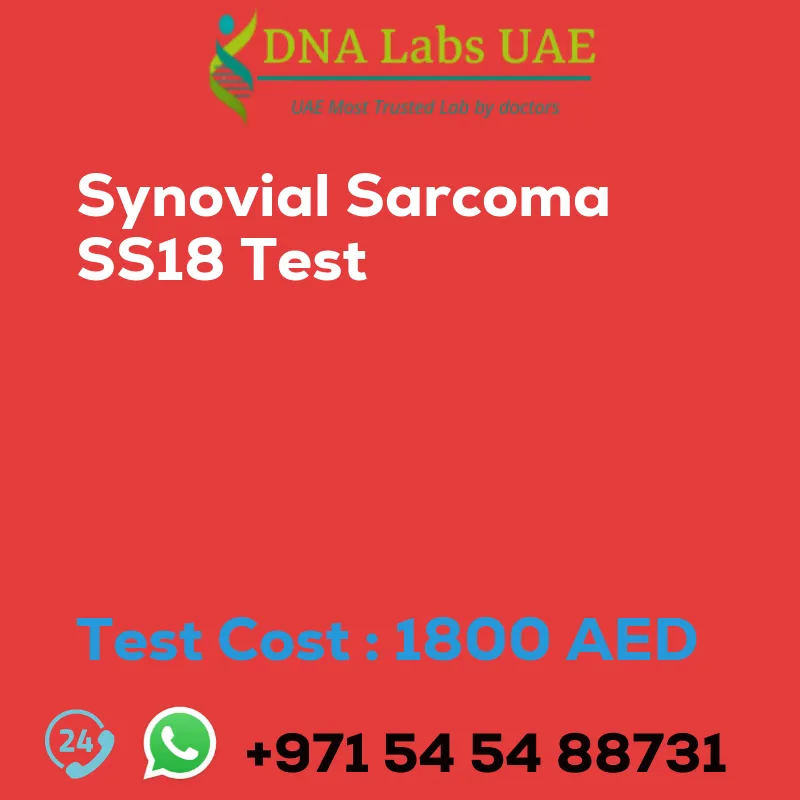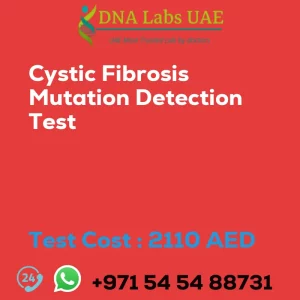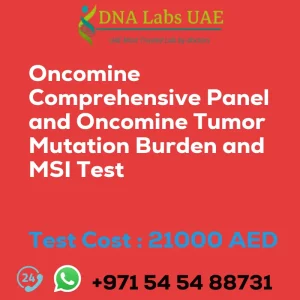Synovial Sarcoma SS18 Test
Test Details
Synovial sarcoma is a rare type of soft tissue sarcoma that typically affects the joints, especially the knee and ankle. It is named “synovial” because it was initially thought to arise from the synovial tissue, which lines the joints. However, recent research has shown that synovial sarcoma actually arises from primitive cells that can differentiate into different types of tissues.
One of the defining features of synovial sarcoma is the presence of a specific genetic abnormality known as the SS18-SSX fusion gene. This gene fusion occurs when part of the SS18 gene on chromosome 18 fuses with one of several SSX genes on the X chromosome. This fusion gene produces a protein that disrupts normal cell growth and division, leading to the development of synovial sarcoma.
Synovial sarcoma can occur at any age, but it most commonly affects young adults between the ages of 15 and 40. It often presents as a painless mass or lump that gradually increases in size. Other symptoms may include joint pain, limited range of motion, and swelling.
Test Name: Synovial Sarcoma SS18 Test
Components:
- Paraffin embedded tissue blocks
Price: 1800.0 AED
Sample Condition: Tumor tissue
Report Delivery: 7-8 days
Method: FISH
Test type: Genetics
Doctor: Oncology
Test Department:
Pre Test Information
Synovial Sarcoma SS18 Test can be done with a doctor’s prescription. Prescription is not applicable for surgery and pregnancy cases or people planning to travel abroad.
Diagnosis and Treatment
The diagnosis of synovial sarcoma is typically made through a combination of imaging tests, such as X-rays, CT scans, and MRI scans, as well as a biopsy to examine the tumor tissue under a microscope.
Treatment options for synovial sarcoma include surgery, radiation therapy, and chemotherapy. The choice of treatment depends on various factors, such as the size and location of the tumor, as well as the stage of the disease.
Despite being a rare cancer, synovial sarcoma has a tendency to spread to other parts of the body, particularly the lungs. Therefore, long-term follow-up and surveillance are important to monitor for any signs of recurrence or metastasis.
Overall, synovial sarcoma is a challenging disease to treat due to its rarity and propensity for recurrence. However, advancements in research and treatment options are continually improving outcomes for patients with this type of cancer.
| Test Name | Synovial Sarcoma SS18 Test |
|---|---|
| Components | Paraffin embedded tissue blocks |
| Price | 1800.0 AED |
| Sample Condition | Tumor tissue |
| Report Delivery | 7-8 days |
| Method | FISH |
| Test type | Genetics |
| Doctor | Oncology |
| Test Department: | |
| Pre Test Information | Synovial Sarcoma SS18] can be done with a Doctors prescription. Prescription is not applicable for surgery and pregnancy cases or people planing to travel abroad. |
| Test Details |
Synovial sarcoma is a rare type of soft tissue sarcoma that typically affects the joints, especially the knee and ankle. It is named “synovial” because it was initially thought to arise from the synovial tissue, which lines the joints. However, recent research has shown that synovial sarcoma actually arises from primitive cells that can differentiate into different types of tissues. One of the defining features of synovial sarcoma is the presence of a specific genetic abnormality known as the SS18-SSX fusion gene. This gene fusion occurs when part of the SS18 gene on chromosome 18 fuses with one of several SSX genes on the X chromosome. This fusion gene produces a protein that disrupts normal cell growth and division, leading to the development of synovial sarcoma. Synovial sarcoma can occur at any age, but it most commonly affects young adults between the ages of 15 and 40. It often presents as a painless mass or lump that gradually increases in size. Other symptoms may include joint pain, limited range of motion, and swelling. The diagnosis of synovial sarcoma is typically made through a combination of imaging tests, such as X-rays, CT scans, and MRI scans, as well as a biopsy to examine the tumor tissue under a microscope. Treatment options for synovial sarcoma include surgery, radiation therapy, and chemotherapy. The choice of treatment depends on various factors, such as the size and location of the tumor, as well as the stage of the disease. Despite being a rare cancer, synovial sarcoma has a tendency to spread to other parts of the body, particularly the lungs. Therefore, long-term follow-up and surveillance are important to monitor for any signs of recurrence or metastasis. Overall, synovial sarcoma is a challenging disease to treat due to its rarity and propensity for recurrence. However, advancements in research and treatment options are continually improving outcomes for patients with this type of cancer. |








